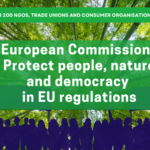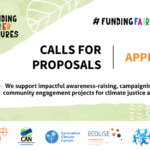To: European Commissioner for Climate
Copy: Executive Vice President Commissioner for the European Green Deal
Dear Commissioner Hoekstra,
We are writing to share recommendations in the context of the Environment Council’s adoption of COP28 Conclusions on 16 October. In a year of record-breaking extreme heat and shifting geopolitics, we are calling on the EU and its Member States to play a leadership role among developed countries at COP28, and to build strong ambition alliances based on equitable approaches to the Global Stocktake, mitigation, energy, loss and damage, adaptation, finance and biodiversity.
An ambitious and equitable Global Stocktake (GST)
The first Global Stocktake’s outcome must reflect the latest science, as set out in the IPCC Sixth Assessment Report, and be guided by the principles of equity and of common but differentiated responsibilities and respective capabilities (CBDR-RC). The GST decision should recognise that the 1.5°C target in the Paris Agreement must be considered as the uppermost acceptable global warming limit and seek to align all action by Parties around keeping warming within this limit.
GST outputs and related COP 28 decisions must propose clear, actionable, and specific pathways to get on track with Paris Agreement goals, including on mitigation, finance, fossil fuel phase-out, just energy transition, loss and damage, adaptation, ecosystem protection and food systems transformation. Resulting policies and updated NDCs must demonstrate 5 yearly common timeframes and should take a gender-responsive, human rights-based approach, including the rights of Indigenous Peoples, and take into account social justice and equity.
Mitigation: updated nationally determined contributions (NDCs) in line with 1.5°C
To have a fair chance of limiting warming to 1.5°C, global greenhouse gas emissions need to peak before 2025 at the latest, and to be reduced by at least 43% by 2030, and by at least 60% by 2035, compared to 2019 levels[1]. Current collective pledges still fall alarmingly short. All Parties to the UNFCCC should increase their NDCs in order to close the “emissions gaps”, and close “implementation gaps” through policies and actions to deliver them. We also highlight that the Paris Agreement stipulates that parties should take action to conserve and enhance their carbon reservoirs and sinks, such as forests and peatlands.
The EU should increase its domestic ambition in line with science and equity, through the EU Climate Law. The EU should achieve at least -65% gross emission cuts by 2030 relative to 1990 levels, complemented by separately enhancing the EU’s natural removal capacity to 600MtCO2e, thereby achieving at least -76% net emission cuts by 2030. The EU also needs to align its target setting and policy framework revisions with the agreed UNFCCC 5-year common time frames, by establishing a 2035 climate target and NDC. It should also set the target to achieve net zero by 2040 at the latest, in line with the call from the UN Secretary General.[2]
Phasing out fossil fuels: a Just and Equitable Global Energy Transition
All UNFCCC Parties should agree to a rapid, just, and equitable global phase-out of fossil fuels in all sectors by 2050 at the latest, in line with a 1.5°C temperature limit.[3] Each country should adopt binding commitments to ensure it does its part, with historically and presently large and rich polluters moving earlier, and developed countries providing funding to support the process in developing countries.The EU should support a full phase-out and refrain from referring to ‘unabated’ fossil fuel phaseout. The EU needs to phase out coal no later than 2030, fossil gas by 2035, and oil at the latest by 2040.[4, 5, 6] It should also commit to an immediate end to all new fossil fuel projects, starting with coal, and not rely on Carbon Capture and Storage projects that are expensive and unproven at scale, as recently reiterated by the IEA.
Parties should agree on a global renewables target: to triple global renewables capacity to 11,000 GW by 2030, deploying at least 1,500 GW per year by 2030. For the EU the global pledge should only be complementary to the energy targets that are agreed at the EU level, exclude nuclear energy and energy from sources of biomass other than fast-decaying wastes and residues with no other uses, and minimise impacts on biodiversity from new infrastructure through sensitive spatial planning and permitting. The EU and its Member States should show leadership through more ambitious national and EU binding targets and policies, leading to at least 50% renewables by 2030 and 100% by 2040.
Parties should also agree to a substantial improvement in energy savings with the aim of reducing total final energy demand on a global level, in an equitable way, by at least a quarter by 2050. The EU should show leadership through implementing more ambitious national targets and overshooting the EU energy savings target; leading to at least 20% energy savings for 2030 and halving energy consumption by 2040.
On energy financing, the EU must demonstrate leadership on fossil fuel subsidies, through a commitment to phase out all fossil fuel subsidies as soon as possible and before 2025, and refrain from referring to ‘environmentally harmful fossil fuel subsidies’ or using other qualifiers. Energy targets adopted at COP28 must also be funded: with adequate financing for an equitable energy transition in developing countries.
Fairer International Climate Finance
Developed countries must ensure the annual USD 100 billion climate finance goal is met on average over the time period 2020-2025, making up for shortfalls in delivery in earlier years. The priority should be on scaling up grants for adaptation finance, to collectively double adaptation finance by 2025 based on 2019 levels, in line with the commitment made by Parties at COP26 which has not yet been fulfilled. EU Member States and the European Commission need to significantly scale-up financing, and should channel part of this through pledges to the 2nd Green Climate Fund (GCF-2) replenishment (compared to GCF1) to achieve a collective doubling of GCF1 pledges in the form of grants.
The EU should support a COP28 decision to operationalise the Loss & Damage Fund, as the centerpiece to new and existing funding arrangements. The Fund should address a wide range of economic and non-economic needs from immediate post-disaster relief, rehabilitation and reconstruction and allow for direct access to finance for local communities. EU Member States and the European Commission should be ready to make multi-year pledges at a scale of billions of USD to the new fund by or at COP28, in the form of new and additional grants. The EU should also play a key role in ‘innovative sources’ for the fund through supporting the implementation of equitable global, EU and national taxes and levies according to the Polluter Pays Principle.[7] [8]
Safeguarding human rights and civil society participation
We call on the EU and international community to protect human rights and civil society participation at international fora. The EU should also continue to engage with the UNFCCC on reforming criteria for COP host countries and host country agreements, in line with the UN Charter and international human rights standards.
Protecting the UNFCCC from conflict of interest
Climate action will always be inadequate if polluting interests, particularly the fossil fuel industry, are allowed to obstruct it. We need a rigorous UNFCCC Accountability Framework to guide engagement with representatives from non-governmental organizations and a definition of what constitutes a conflict of interest.
Yours sincerely,

Chiara Martinelli, Director, Climate Action Network (CAN) Europe
Download the full letter here.
[1] As set out in the IPCC Sixth Assessment Synthesis Report: Climate Change 2023 [2] See also CAN Europe’s position on the EU Climate Targets & Equitable GHG budget for the EU [3] See CAN Position: Global targets renewables and energy efficiency alongside fossil fuel phaseout [4, 5, 6] See IEA net zero report; ESABCC Net Zero Roadmap; and Civil Society 10 Point Plan for fossil gas phaseout [7] See also CAN Europe New Resources for public climate finance and for the Loss and Damage Fund [8] For further recommendations, see CAN Europe's 14 Recommendations for ECOFIN Council Conclusions on Climate Finance



